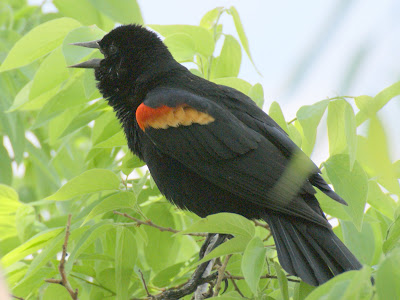.Last weekend a cousin from Utah came to stay with us for a few days. As she isn't very familiar with this part of the world, we decided to take her to Brazos Bend State Park. We've been there so many times that it feels almost like an old friend - and it never disappoints us or any visitor that we take there. We were hoping to show to give our guest close-up views of alligators - and I was hoping that the park would produce one of my favorite Texas birds, the beautiful Purple Gallinule.
As we turned into the entrance road, we noticed that the park now has a new sign.
After seeing the sign, the first priority for our cousin was naturally to see an alligator. So we walked down to 40 Acre Lake and almost immediately spotted a medium-sized gator posing on a log.
A couple of minutes later we passed - in our cousin's case rather nervously - another medium-sized gator lying by the side of the path.
The walk around the lake produced ten more alligators and it also turned up plenty of birds.
The trees by the trail were attracting male Red-winged Blackbirds, who were busy singing for mates.
The sky overhead was criss-crossed by Great Blue Herons, Great Egrets, White Ibis and Black-bellied Whistling Ducks while the edge of the lake had numerous American Coots.
There were also lots of Common Gallinules, until recently called Common Moorhen.
A few Pied-billed Grebes were swimming and diving.
A Green Heron was too secretive to photograph but a Black-crowned Night Heron was less concerned by our presence.
A few yards further along the path we came across a Yellow-crowned Night Heron.
Then we saw our fifth heron species of the day, a Little Blue Heron.
By the time we reached the observation tower we still hadn't seen a Purple Gallinule. However, we had gone only a few yards down the path towards Elm Lake when one appeared in the marshland to our left. Purple Gallinules normally wander along quite slowly when they are feeding but this one was positively hurrying, moving quite literally in leaps and bounds.
Having seen more than enough to satisfy our guest, we headed to Elm Lake to have a mini-picnic before driving home. Since it was Easter Sunday, the Elm Lake section of the park was crowded with families enjoying lunch at the picnic tables and on the grass. Every parking space was taken but we managed to squeeze in among the scores of cars parked by the roadside. While Dee and our cousin had a quick tailgate lunch, I strolled down to the lake.
Faced with so many human visitors, most of the lake's birds had retreated far out into the water. A few Black-bellied Whistling Ducks were the exception.
As usual, our visit to the park had been very enjoyable and we had seen a range of interesting birds. We must remember to come back in a couple of months, though, when we'll be able to enjoy watching the Coots and Gallinules raising their chicks.
.












5 comments:
Thank you for the wonderful trip down memory lane. I spent many happy days at Brazos Bend during my childhood when we would visit family in the Houston area.
I'm glad to hear that, Jason. If you want to see several posts about previous visits to BBSP, put "Brazos Bend" in the search box of my blog.
Went to Kelb Woods yesterday but couldn't find owl nest. We crossed the concrete pad with picnic tables and took the left trail off pad. After about 40 yards came to intersection of 4 trails. 2 just circled back around to start and then 2 were main trail. Is this the second fork you referred to or is it the fork if you follow the main trail forward for anothr 1/2 mile and cross wetlands area and then come to a fork near the end of this section of park? I looked at both forks but was just hoping to narrow area. Headed to San Bernard today but might try to see owls tomorrow evening. Thanks again.
Sorry I missed your comment earlier, Eric. I was at the site this morning and the owls have now left the nest.
Over the past couple of years I have only seen Yellow-Crowned Night Herons about three times in this area and they always been only one. This year I have seen them in just the past couple of weeks and they have always been in group. Once I count 10 in a field together. The population must really be booming this year.
Post a Comment